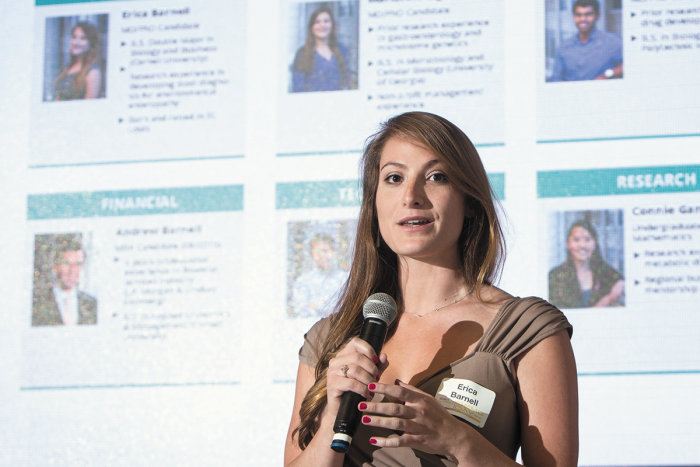IDEA Labs hosts first national Demo Day
On April 25, the incubator will include students from other universities at its annual Demo Day, the group's capstone event
 Jerry Naunheim Jr.
Jerry Naunheim Jr.Medical student Erica Barnell explains Geneoscopy at Demo Day 2015. The student-formed company aims to reduce preventable colorectal cancer deaths by creating a test with the accuracy of a colonoscopy and the benefits of a non-invasive procedure that evaluates biomarkers in stool samples.
Eyeglasses that can instantaneously change prescriptions with the touch of a button. Superior air filtration to ensure maximum cleanliness in hospitals. An automated messaging system that uses calls or text messages to help manage patients’ conditions.
These are just a few of the innovations presented at last year’s Demo Day, the annual capstone event for IDEA Labs, a Washington University-based bioengineering and design incubator founded and run by students. Through IDEA Labs, interdisciplinary teams develop potentially marketable solutions to clinical problems and present those solutions at Demo Day.
This year, Demo Day will offer more innovations — but from beyond Missouri’s borders, as well. Students from newly formed chapters at Harvard-MIT, the University of Pennsylvania and the University of Minnesota will travel to St. Louis to present their ideas and compete for financial prizes. IDEA Labs’ first national Demo Day will be Monday, April 25, at CIC St. Louis, 4240 Duncan Ave. in the CORTEX Innovation District.
Poster presentations will begin at 6 p.m., with select teams competing in pitch competitions on stage from 7:30-8:25 p.m. Health-care professionals, engineers, researchers, and members of the entrepreneurial and biotech communities are encouraged to come and review the students’ ideas and prototypes. Students interested in joining IDEA Labs also are invited to join.
The event will conclude with a keynote speech from MIT’s Robert Langer, PhD, the most cited engineer in history.
Demo Day will feature 20 new teams that have tackled 20 new problems this year. Meanwhile, more than 10 teams have continued working toward solutions to problems they took on during previous sessions. Initially, IDEA Labs teams were made of primarily medical and engineering students, but they’ve been expanded to include business students. Some teams also include students from other area schools, including Saint Louis University and the University of Missouri-St. Louis.
The problems addressed are submitted primarily by physicians who have witnessed issues in their own practices but lack the time or technical expertise to address them. IDEA Labs collects the problems in a database and appoints team leaders, who then select problems based on a variety of factors, including marketability. Each fall, those leaders then recruit students at Problem Day to form teams to address the problems.
Among Washington University medical students, more than 25 percent of the school’s first-year students applied to IDEA Labs for the 2015-16 school year, thanks to the nonprofit’s clinical outreach team led by first-year medical students Christine Averill and Lillian King. The two are working with School of Medicine administrators to introduce innovation education into the curriculum, starting in medical students’ first year.
The hope is that as students progress through clinical rotations, they will identify limitations in patient care and technology and add such conundrums to IDEA Labs’ database. The outreach team also is considering options to simplify the process of submitting problems for review — perhaps through a dedicated smartphone app or a mobile-friendly website accessible from residents’ work phones.
On a national scale, the outreach team is building a partnership with the American Medical Association to identify pressing medical problems from around the country that can be tackled by the group’s growing network.
Among IDEA Labs’ successes, the St. Louis Business Journal named two companies that found their start through the incubator — Epharmix and DataDog Health — as two of the top 10 fastest growing technology startups in St. Louis. And at the St. Louis Regional Chamber’s annual Arcus Awards, IDEA Labs took home the BMO Harris Spirit of St. Louis Award, which recognizes individuals and organizations that make St. Louis a great place to live, work and invest.






